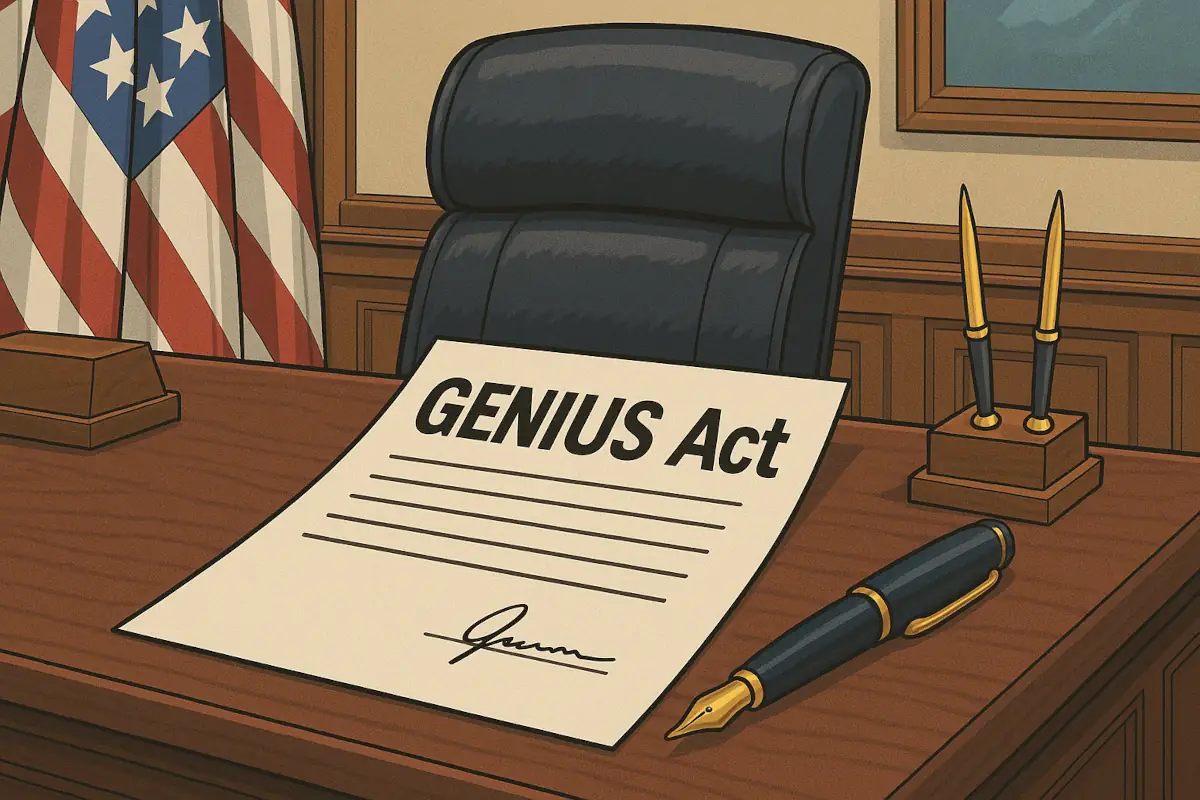The United States is moving closer to defining rules for stablecoins through a proposed law called the Guiding and Establishing National Innovation for US Stablecoins (GENIUS) Act. The bill is gaining attention after clearing a major hurdle in Congress earlier this week. It aims to create clear laws on who can issue stablecoins and how they should be managed.
The act comes when government leaders, including Senator Elizabeth Warren, have expressed concerns over private entities designing digital currencies that mirror the U.S. dollar without proper regulation. The new bill will provide structure while also allowing room for stablecoin innovation.
Table of Contents
What is the GENIUS Act?
The GENIUS Act was first introduced in February 2025. Backed by four sponsors, including Senate Banking Committee Chair Tim Scott, the proposal sets out to lay down ground rules for how stablecoins should be issued and managed in the United States. Stablecoins are digital tokens whose value is tied to assets like the US dollar or gold, offering significantly less price fluctuation than cryptocurrencies like Bitcoin.
The bill proposes clear steps for companies that wish to create or issue stablecoins. Firms like Meta, which may plan to offer their own tokens, would be required to meet licensing requirements. These include strict financial reserves and regular checks from federal bodies. The bill also explains which government agencies – federal or state – will oversee these companies, based on their size and type.
Under the GENIUS Act, banks issuing stablecoins with a total value of $10 billion or more would be monitored by the Federal Reserve. For non-banking firms of similar size, the Office of the Comptroller of the Currency would take over regulatory duties. Smaller firms could fall under the control of state-level authorities.
Read also: Tether Is Preparing First Full Audits For USDT Transparency
Senators Push for a More Open Crypto Market
Senator Bill Hagerty offered a pointed view on why such a law is needed now. He argued that unclear and often hostile federal attitudes toward cryptocurrency under past administrations have held back development. He stated:
“The previous administration’s hostility toward crypto and refusal to provide clear regulatory guidelines have severely stifled stablecoin innovation.”
Paul Atkins, who leads the SEC’s Crypto Task Force, expressed strong confidence that the bill will be approved:
“We have every expectation now that it’s going to pass.”
Support for the GENIUS Act spans both government and industry. The House Financial Services Committee passed the proposal in April 2025, which allowed it to progress to the Senate for a final vote. The crypto sector has responded with support, seeing the bill as a turning point in how digital finance will be integrated into the wider U.S. economy.
Why U.S. Leaders Are Backing Stablecoins?
Stablecoins are increasingly being viewed by many governments as a practical way to make cross-border financial transactions faster and less expensive. The U.S. is no exception – Tim Scott described them as an advance that fits naturally with today’s economy.
“Stablecoins enable faster, cheaper, and competitive transactions in our digital world and facilitate seamless cross-border payments. From enhancing transaction efficiency to driving demand for US Treasuries, the potential benefits of strong stablecoin innovation are immense.”
This idea is not limited to lawmakers. U.S. President Donald Trump has aligned with private efforts supporting the USD1 stablecoin, suggesting broader political backing for such digital assets. This adds weight to the argument that stablecoins could eventually serve as a new form of widely accepted digital money, possibly rivaling traditional systems like SWIFT for cross-border transfers.
Visa, PayPal, Polygon Eye Stablecoins
Large financial and tech companies are already preparing to adjust to a new reality where stablecoins play a central role. Firms like Visa, Mastercard, and PayPal are studying how to add stablecoin services to their platforms. In the blockchain sector, Polygon has announced plans to concentrate efforts this year on stablecoin development in response to rising interest from large institutions.
Coinbase has become one of the loudest voices in support of the GENIUS Act. The company, known for its influence in Washington, had earlier avoided backing single-topic legislation. But now that broader crypto legislation is struggling in Congress, Coinbase has switched gears. The company is making direct appeals to lawmakers and encouraging its users to contact their senators.
CEO Brian Armstrong publicly urged for immediate action. Alongside this, Coinbase’s Stand With Crypto group warned it would drop lawmakers’ grades if they blocked the GENIUS Act from progressing. Over the weekend, the platform even pushed notifications to its app users, calling on them to write to their senators to push the bill forward.
Crypto Cash Fuels GENIUS Act Push
Behind the scenes, large sums of money and political influence are being deployed to support the GENIUS Act. Last year, Coinbase and several other major crypto companies raised more than $300 million for pro-crypto political action committees. These groups spent heavily on key congressional races and are now raising tens of millions for the upcoming 2026 midterms.
At the international level, other regions are also moving quickly. Hong Kong passed its own stablecoin law on May 21, 2025, and expects it to come into effect within the year. That adds pressure on U.S. lawmakers to act swiftly, or risk falling behind in the global race to shape the future of digital finance.
A Turning Point or Another Hurdle?
The GENIUS Act still needs final approval from the Senate, but the progress it has made shows a strong effort to bring order to a fast-growing market that has had very few regulations. The goal is to give stablecoin issuers a clear legal path while still allowing new ideas to develop.
With support from well-known figures and increasing political attention, the final decision could change how the U.S. handles cryptocurrency regulation in the future.
Read also: Everything You Need to Know About the Digital Euro




